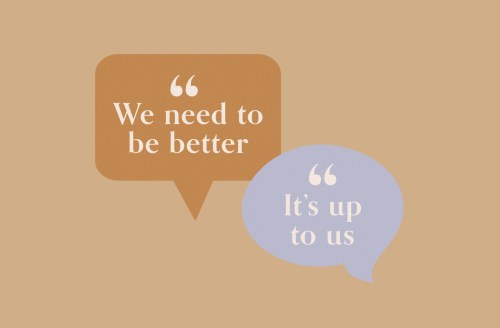Why Everyone’s Journey With Allyship Needs To Include a Self-Examination of Pronoun Use
Passive othering can come in the form of pronouns. Here's how to eliminate white normativity in language, according to linguists.

Let’s talk about a two-letter word with big implications: “we.” A couple of recent examples of how I’ve seen white people who are just now waking up to the (not-at-all new reality) of systemic racism in this country use the word “we” include “WE need to be better” and “It’s up to US to fix this.” These statements—whether communicated vocally to a gathering of people on a Zoom call, written in a social media post, or otherwise—may well reflect an intent to take action to “do better,” but the pronoun choices are problematic because they back up white normativity in language. The word choice is exclusionary, othering, and requires dedicated attention in order to improve upon and reverse.
According to Krystal A. Smalls, PhD, a professor of linguistics and anthropology at the University of Illinois, the probable intention of white people in this use of language is signifying solidarity with Black people, POC, and racial-justice activists of all backgrounds. “‘We’, a plural first-person subject pronoun, is often used by white and non-Black allies when talking about racial justice, and more recently, when talking about anti-Black racism in particular,” she says. “In tandem, its object counterpart ‘us’ and the plural possessive ‘our/s’ may be used.”
And yet, these are deictic words—meaning their definitions require additional context to be understood, and when the context shifts, so too does the meaning. So, exactly whom constitutes the collective “we” in many of these declarations often lacks clarity, and that can become inherently problematic.
“Many of these statements about what ‘we’ need to do differently or about ‘our’ failures or silences implicate a very specific, or exclusive, referent—white people—but typically leave it unnamed,” Dr. Smalls says. “This ‘we’ clearly does not refer to Black people, to other POCs in the context of multiple racisms, or to lifelong racial-justice activists of various racial denominations—groups for whom the burdens of speaking up and critically examining oneself are not new and/or optional.”
Sociocultural linguist Jamie A. Thomas, PhD, adds that when white people who desire to be part of the solution use the term ‘we’ in regards to what needs doing and redressing in the landscape of systemic anti-Black oppression, they neglect to name their specific roles—both passive and active—in perpetuating a system they benefit from. The failure to see this inherent and inherited complicity, regardless of a personal identification as “good,” is one of the key barriers she says we face, culturally, in striking anti-racist change.
“There is an urgent need for white people to own and articulate their participation in white supremacy. This self-owning is erased by the pronoun ‘we’ silencing and obscuring white complicity.” —Jamie A. Thomas, PhD, sociocultural linguist
“There is an urgent need for well-meaning white people to own and articulate their participation in white supremacy and act now to dismantle these advantages by seeing each and every way that ideals of whiteness are prioritized and normalized,” says Dr. Thomas. “Where this self-owning is erased by the collective first-person pronoun ‘we,’ it performs a silencing and obscuring of white complicity, and it aids individuals in continued denial.”
In essence, where pronouns like “we” may aim to offer solidarity and support, in effect, they passively other members of the Black and BIPOC communities. The words assume a white audience via white normativity in language choice, and can produce a fog in which crucial identities and their differences are lost. Furthermore, the lack of clarity can dismiss the individual accountability of one’s role in systemic racism. For instance, “if anti-Black racism is a problem that ‘we’ must fix, then ‘my’ responsibilities are perhaps not as immediate as they can and should be,'” says Dr. Thomas, explaining how pronouns can remove urgency and responsibility.
Because words are extremely powerful, shifting language choices in simple ways can make dramatic change. On a systemic level, education on the nuances of racialized linguistics should be mandatory learning, and on a personal level, resources like the Smithsonian’s “Talking About Race” tool or this Racial Equity Glossary can help illuminate the basics. And when addressing groups, it’s important to always address the intersectionality of different identifications.
In Dr. Thomas’s introductory linguistics course at Santa Monica College, a Los Angeles-area community college, she asks her students (of all colors, nationalities, and languages) what anti-racist actions they’re committing to going forward. She explicitly names her identity as an African-American woman, and describes her regular practice of “reevaluating my commitments to self-education and centering oppressed and marginalized voices.” Doing this creates a bold statement of “I over we.”
“I ask my students, ‘Is it we or is it me,’” she says. “It’s a public-facing self-own that also encompasses my responsibility to remain a listener, inasmuch as I have my own firsthand experiences of discrimination to tell. And it’s also about my willingness to have courage to choose now as the time to act, understanding that many more before and around me, of a range of embodiments, have actually been targets of exclusion and violence for standing up.”
The component at play is delineating when talking about different identities, and not implying white normativity in language. “When white allies want to acknowledge their complicity in structural and interpersonal racism, or when they want to articulate their commitments to racial justice, I hope they realize that they have a golden opportunity to actually perform that work by naming themselves explicitly and, more importantly, by naming the structure that provides them the option of not doing so,” says Dr. Smalls.
Sign Up for Our Daily Newsletter
Get all the latest in wellness, trends, food, fitness, beauty, and more delivered right to your inbox.
Got it, you've been added to our email list.








